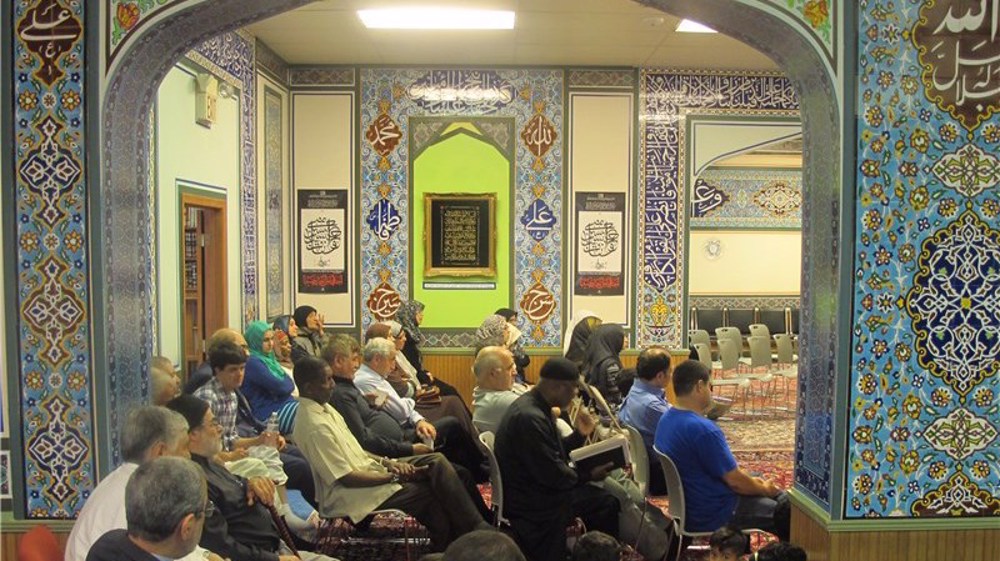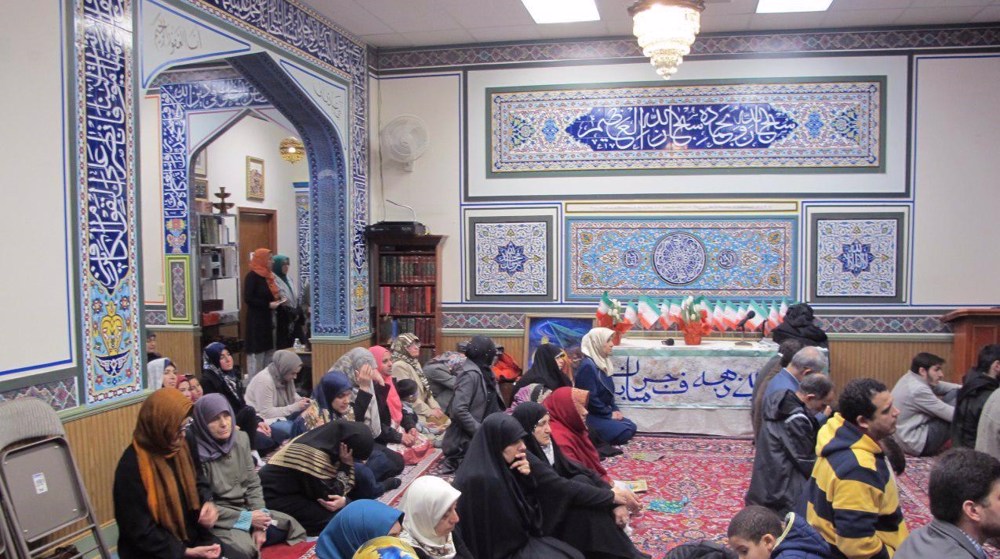The tiles, which are adorned with Qura'nic verses, were shipped in June from the Iranian city of Qom, to be used in construction of the Manassas Mosque in northern Virginia.
However, they were confiscated at Dulles International Airport after they were deemed to violate sanctions on Iran, the mosque's imam Abolfazl Nahidian said on Tuesday.
The tiles were a gift and he paid no money for them, but custom authorities at the airport blocked him from claiming them citing the sanctions, he told a news conference at the mosque.
 Worshipers attend a function at Manassas Mosque in Virginia. (Photo by Tasnim)
Worshipers attend a function at Manassas Mosque in Virginia. (Photo by Tasnim)
A letter from Customs and Border Protection informed the mosque that the tiles must be either shipped back to Iran or destroyed, the Associated Press cited him as saying.
Destroying the tiles, which are adorned with Qur'anic verses, "is the same as destroying verses of the Qur'an, or the whole Qur'an itself”, Nahidian said.
The mosque is now asking the Biden administration to release the custom-made tiles.
Nahidian said he has received other tile shipments throughout the years without incident, including one shipment that arrived eight months ago. He has led the mosque for nearly three decades.
The Biden administration is locked in a standoff over the US return to a 2015 nuclear deal with Iran, showing an aversion to remove the most draconian sanctions which its predecessor imposed on the Islamic Republic.
President Joe Biden has admitted that Washington was wrong to abandon the nuclear agreement, but he is showing an urge to retain some aspects of the sanctions as leverage to pressure Iran.
Food, medicine and other humanitarian supplies are purportedly exempt from the sanctions that Washington imposed on Tehran after former president Donald Trump walked away from the international deal over Iran’s nuclear program.
But the US measures targeting everything from oil sales to shipping and financial activities have deterred any dealing with Iranians - including humanitarian activities.
A spokesperson for Customs and Border Protection confirmed that the tiles were placed on hold June 21, citing the US Treasury Department's Office of Foreign Asset Control (OFAC) that determined the tiles could not be imported under the sanctions imposed on Iran.
Nihad Awad, executive director of the Council on American-Islamic Relations, said whatever one's views are of the Iranian sanctions, it makes no sense to enforce the rules on a benign piece of religious art.
“We believe the government should have common sense,” he told the Associated Press.
At Tuesday's news conference, speakers suggested that anti-Islam sentiment may have also played a role in the confiscation.
“If this were a statue of the Virgin Mary, would we be here discussing this?” asked Rafi Uddin Ahmed, president of the Muslim Association of Virginia.
 Worshipers listen to a speaker at Manassas Mosque in Virginia. (Photo by Tasnim)
Worshipers listen to a speaker at Manassas Mosque in Virginia. (Photo by Tasnim)
The tiles, weighing about 340 kg, are to be used to decorate the “mihrab,” a niche indicating the direction of prayers.
They include verses from the Qur'an, Islam’s revealed text, including verse 144 of the second chapter Al-Baqara (The Cow):
“Indeed, We see you [O Prophet Muhammad] turning your face toward heaven. Now We will make you turn toward a direction of prayer that will please you. So turn your face towards the Sacred Mosque in Mecca — wherever you are, turn your faces towards it.”
The Council on American-Islamic Relations (CAIR), the largest Muslim civil rights and advocacy organization in the US, has called on the Department of Homeland Security and the Treasury Department to release the tiles.
“Confiscating these Qur'anic tiles simply because they came from Iran was unwarranted and destroying them would be absolutely unacceptable. Forcing this Virginia mosque to send the tiles out of the country would be just as unacceptable; it would also send a negative message to the American Muslim community and Muslims worldwide,” CAIR National Deputy Director Edward Ahmed Mitchell said.